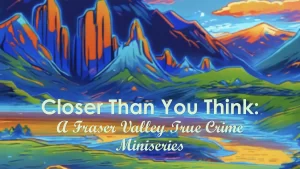This past winter semester, Women, Violence & True Crime, a new course at UFV, transported students into the world of murder. The creator and teacher of this class, Dr. Kathleen Rodgers — alongside two of her students, Ava Bruintjes and Syd Reid — shared their journey with The Cascade.
For Rodgers, it all started when she was listening to a true crime podcast and noticed a trend in its consumers.
“I realized though that there was something around the podcast going on that was really interesting, which was that women in particular were talking about violence around podcasts … not just the content, but also the violence that they experience.”

The idea grew from there as more questions arose regarding how the true crime genre shapes the perception of crime and violence against women. Rodgers took this as inspiration for the course.
“I developed this course as a way of focusing on some of the questions that I wanted to ask and also giving students an opportunity to do the same thing.”
Bruintjes, a fourth-year Criminology major, commented on the importance of ethics within the course, as that was what initially drew her to Rodgers’ class.
“We spend a lot of time talking about ethics, about the different forms of true crime media … At the end of the day, people are profiting off of real life pain, death, and suffering. Regardless of how ethically you do it, you’re still making money off of it.”
As part of the course, students were given the opportunity to create a podcast and meet with industry professionals, including radio journalist Mike McCulloch and CIVL Radio’s Executive Director, Aaron Levy, with whom the students discussed their experiences regarding the ethics and delivery of different stories. Rodgers shared her gratitude for Levy, who provided insight into both the ethical and technical aspects of the podcast.
“We definitely could have done this without him, but it wouldn’t have been good. He made it great. He’s been incredible. I mean, just in terms of providing guidance, equipment, and training, like, amazing.”
The podcast, “Closer Than You Think: A Fraser Valley True Crime Miniseries,” consists of eight episodes discussing distinct cases within the Fraser Valley. Rodgers gave her students a choice: analyze a pre-existing true crime podcast or make their own with a local case using what they learned in class. Reid shared that their desire to shine a spotlight on stories that hadn’t been covered appropriately, or hadn’t been treated ethically, led them to create their own episodes.
“There are a few racialized minorities and gender minorities that we’re trying to include. And it’s been very interesting.”
Bruintjes and Reid praised Rodgers for making the class instructive and fun and agreed that balancing entertainment and ethics was one of the biggest struggles. Bruintjes shared that it helped them to be conscious of the problems discussed in the course, which encouraged them to put a stronger emphasis on the victim rather than the glorification of the murderer.
“I think every single group is hyper-aware of the common harmful tropes and stereotypes that a lot of podcasts play into, and they’re really trying to pull away from that and talk about the cases that don’t get covered by podcasts or talk about cases in a way that [is] not romanticizing the crime or uplifting the killer … focusing on the victims, their stories, making sure that their voice is heard in a way that doesn’t take away from who they were as a person.”
What’s portrayed in podcasts isn’t always reflective of reality. Rodgers uses a common true crime trope as an example: strangers portrayed as dangerous and something to be feared, when in reality, most violent crimes are committed by those close to the victim.
“We become conditioned to be afraid of those situations, but the kind of situations that we should be afraid of is the fact that we’re most at risk from the people we lock ourselves in with at night. We’re most at risk from interpersonal domestic violence. True crime doesn’t really tell those stories well. It focuses primarily on stranger violence.”
Rodgers believes that the course has been a success; her students have found a way to tell these stories in an entertaining and respectful way. She’s also optimistic that the true crime genre is slowly shifting for the better, and is eager to see what the future will bring.
“I do see changes happening, and I do see a diversity of stories being told in different ways. And I think that’s really exciting.”
Beginning on Apr. 9, tune in to this true crime podcast on CIVL radio (101.7 FM) Wednesdays and Thursdays at 7 p.m.!
Interviews have been edited for length and clarity


